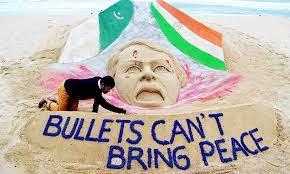The question of whether India should participate in international organizations against Pakistan is a complex one. On the one hand, India has legitimate grievances against Pakistan, including its support for terrorist groups operating in India, such as Lashkar-e-Taiba and Jaish-e-Mohammed. On the other hand, there are several reasons why India should not participate in international organizations against Pakistan.
Firstly, India and Pakistan are both nuclear-armed countries, and any escalation of tensions between the two could have catastrophic consequences for the region and the world. By participating in international organizations against Pakistan, India risks further inflaming tensions and could even trigger a military conflict. Given the high stakes involved, it is prudent for India to pursue diplomatic channels to address its concerns with Pakistan.

Secondly, India's participation in international organizations against Pakistan could be seen as an act of aggression by Pakistan, which could in turn take retaliatory measures against India. This could include supporting separatist movements in India, conducting cross-border raids, or even launching terrorist attacks on Indian soil. By avoiding direct confrontation and instead pursuing diplomatic solutions, India can avoid giving Pakistan any pretext to escalate the conflict.
Thirdly, India's participation in international organizations against Pakistan could damage its relationship with other countries in the region, particularly China. China is a close ally of Pakistan and has a vested interest in maintaining stability in the region. By taking a hardline stance against Pakistan, India risks alienating China and jeopardizing its own strategic interests.
Fourthly, India's participation in international organizations against Pakistan could be seen as an attempt to undermine Pakistan's sovereignty and territorial integrity. This could provoke nationalist sentiments in Pakistan and make it more difficult for the Pakistani government to take a conciliatory approach towards India. Instead, India should focus on addressing specific concerns, such as cross-border terrorism and the treatment of minorities in Pakistan, through diplomatic channels.
Finally, India's participation in international organizations against Pakistan could distract attention from its own domestic issues, such as the ongoing farmers' protests, the COVID-19 pandemic, and the economic downturn. By focusing on external issues, India risks neglecting pressing internal issues that require urgent attention.
In conclusion, while India has legitimate concerns about Pakistan's support for terrorist groups and other issues, it is in India's best interest to pursue diplomatic channels to address these concerns rather than participate in international organizations against Pakistan. By avoiding direct confrontation and pursuing diplomatic solutions, India can minimize the risk of escalation and maintain its strategic interests in the region.